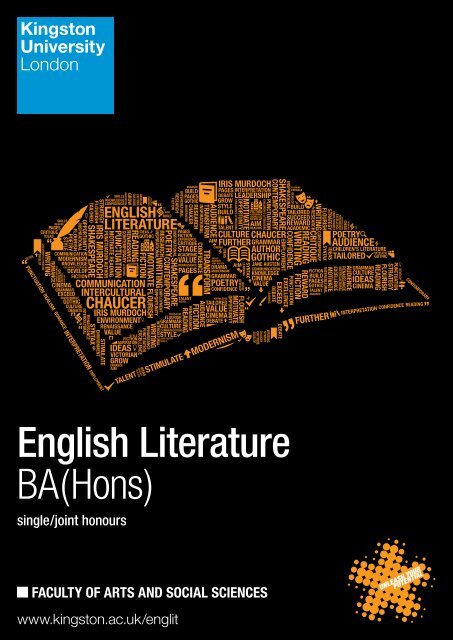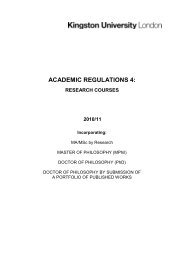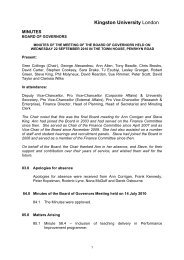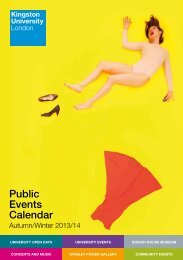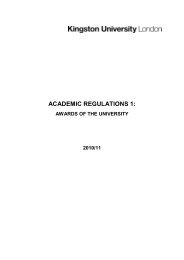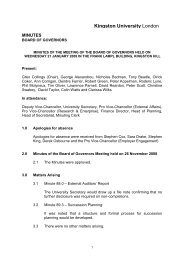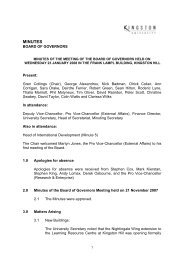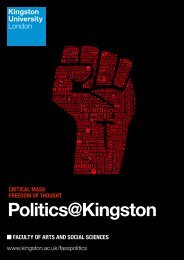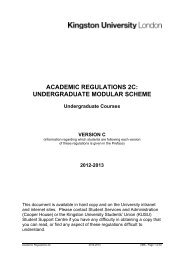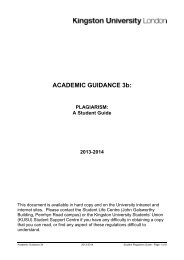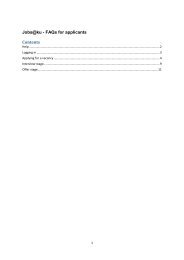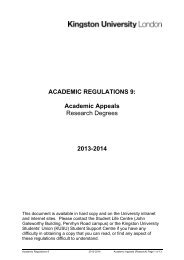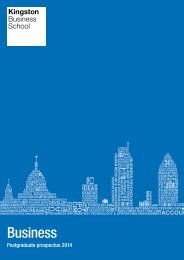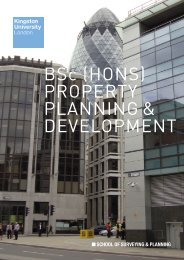English Literature BA(Hons) - Kingston University
English Literature BA(Hons) - Kingston University
English Literature BA(Hons) - Kingston University
Create successful ePaper yourself
Turn your PDF publications into a flip-book with our unique Google optimized e-Paper software.
<strong>English</strong> <strong>Literature</strong><br />
<strong>BA</strong>(<strong>Hons</strong>)<br />
single/joint honours<br />
Faculty of Arts and Social Sciences<br />
www.kingston.ac.uk/englit
<strong>English</strong> <strong>Literature</strong> <strong>BA</strong>(<strong>Hons</strong>)<br />
single/joint honours<br />
This intellectually rigorous and stimulating course<br />
provides the opportunity to study a wide range<br />
of <strong>English</strong> literature, from Chaucer to the present,<br />
and examines the relationship of literature with<br />
culture, politics and individual identity. You can<br />
choose to study <strong>English</strong> <strong>Literature</strong> alongside<br />
another subject and will have the chance to study<br />
abroad at a partner university in your second year.<br />
Why study <strong>English</strong> literature<br />
at <strong>Kingston</strong> <strong>University</strong>?<br />
• <strong>Kingston</strong>’s <strong>English</strong> department was<br />
awarded an ‘excellent’ rating at its last<br />
Teaching Quality Assessment.<br />
• Student feedback consistently emphasises<br />
the quality of our teaching and the<br />
approachability of staff. At <strong>Kingston</strong>, we<br />
put the student experience first among our<br />
priorities.<br />
• Lecturers at <strong>Kingston</strong> publish research<br />
of national and international importance,<br />
and this cutting-edge research informs our<br />
teaching practice.<br />
• <strong>Kingston</strong> has a dynamic and diverse<br />
student body and is welcoming to both<br />
school leavers and mature students.<br />
• <strong>English</strong> at <strong>Kingston</strong> offers a rich<br />
engagement with a wide range of literature<br />
from Chaucer to the present day.<br />
• The course combines broad-based<br />
coverage with specialist options and<br />
opportunities for independent study.<br />
• We have a lively intellectual community,<br />
and bring in world-renowned speakers for<br />
special events.<br />
•We aim to produce active, independent<br />
learners with highly desirable career skills.<br />
• We are excellently located in relation to<br />
London and its facilities.<br />
The <strong>English</strong> <strong>Literature</strong> degree is situated in<br />
the School of Humanities, alongside subjects<br />
such as Creative Writing, <strong>English</strong> Language<br />
& Communication, and Journalism. There<br />
is fertile cross-communication between<br />
these fields, with a number of extracurricular<br />
activities across the School, including lectures<br />
by visiting academics, readings by published<br />
and aspiring writers (including Writers in<br />
Residence such as Paul Bailey and Hanif<br />
Kureishi), dramatic performances and films.<br />
Visiting professors in the Faculty also provide<br />
input into the field. The study of <strong>English</strong><br />
<strong>Literature</strong> at <strong>Kingston</strong> encourages students<br />
to take an active part within a supportive<br />
and academically stimulating environment.<br />
There is also a well-established postgraduate<br />
culture in the field, and successful students<br />
may progress to masters-level courses.<br />
Teaching, assessment and support<br />
Teaching is delivered through a mix of formal<br />
lectures, workshop activities, small group seminar<br />
teaching, and one-to-one supervision. Lecturers<br />
also have regular weekly office hours during<br />
which students can seek individual consultation.<br />
Modules are assessed in a variety of ways,<br />
but primarily through essay writing, exams,<br />
presentations, and projects.<br />
Throughout your time at <strong>Kingston</strong>, you will develop<br />
an advanced understanding of the relationship<br />
between critical, conceptual and theoretical<br />
frameworks and literary texts. This will culminate<br />
in a Year 3 module entitled ‘Great Expectations:<br />
Theory and Research in Practice’. The content<br />
of the module is designed to provide you with a<br />
range of topics and conceptual approaches that<br />
will inform your dissertation projects, thereby<br />
promoting lateral thinking and enabling you to<br />
produce a piece or writing with real-world impact.<br />
Together with the dissertation, you are given the<br />
opportunity to expand your existing transferable<br />
skills in independent study and research, group<br />
work, and time management, and to develop<br />
valuable employability skills.<br />
Personal Tutor Scheme<br />
The teaching team is committed to providing<br />
the support you need to facilitate your transition<br />
to university life. We pride ourselves on our<br />
approachability and readiness to help. The<br />
personal tutor scheme, designed to help you from<br />
your very first week, is the embodiment of this<br />
commitment. As an integral part of your first year of<br />
study, you will be placed in a small seminar group,<br />
led by the same member of the teaching team<br />
for the whole year. That seminar leader will also<br />
be your personal tutor, not just for the first year,<br />
but throughout your degree, providing support in<br />
your learning, your personal development and in<br />
developing your career aspirations.<br />
Careers and employability<br />
Successful completion of an <strong>English</strong> literature<br />
degree shows potential employers that you have a<br />
range of valuable skills including:<br />
• advanced literacy and communication skills;<br />
• the capacity to analyse and critically assess<br />
diverse forms of writing;<br />
• the ability to deal with substantial quantities<br />
of complex information in a structured and<br />
systematic way;<br />
• the capacity for independent thought;<br />
• the capacity to frame a persuasive argument,<br />
both orally and in writing;<br />
• skills in critical reasoning;<br />
• creative and imaginative responsiveness;<br />
• research and bibliographic skills;<br />
• the capacity to function effectively in groups and<br />
to work independently;<br />
• competence in recognising and responding<br />
appropriately to the requirements of a task; and<br />
• time-management and organisational skills.<br />
This skill base gives graduates of <strong>English</strong> a flexible<br />
range of employment possibilities.<br />
Graduates of <strong>English</strong> work in a range of<br />
professions, including advertising, leisure<br />
and tourism, arts management, business<br />
management, journalism, IT, law (via a conversion<br />
course), marketing, media, curatorship, publishing<br />
and TEFL. Some students do teacher training or<br />
masters courses, while some go on to study for<br />
a PhD. Our graduates have achieved success in<br />
a number of different fields, such as librarianship,<br />
the civil service, personnel and fundraising. Some<br />
have continued their education or training, for<br />
example in counselling, nursing and computing.<br />
One recent graduate took a law conversion course<br />
and went on to become a barrister.<br />
Student feedback<br />
Here is what our students say:<br />
“The lecturer has such an enthusiasm for this<br />
subject and made it really interesting. This module<br />
is so original and only one of a few on degree<br />
courses – well done for including it on the course.”<br />
“Brilliant novels with everything you could want –<br />
they’re exciting, mysterious, with murders, love,<br />
death…”<br />
“I found the content and style of the lectures and<br />
the lecturers very inspiring, really helping to feed<br />
enthusiasm for the subject.”<br />
“Our seminars were brilliant and stimulating. The<br />
lecturer challenged us on every front.”<br />
“Detailed discussions of texts in seminars helped<br />
my understanding a great deal. My knowledge of<br />
poetry has greatly improved, as has my enjoyment<br />
of it.”<br />
“I learned so much in the seminars. Things like<br />
exercises and how to do them were made really<br />
clear, and going through my work in a group really<br />
helped me to improve it and understand what I<br />
was doing.”<br />
“I would recommend <strong>Kingston</strong> and their <strong>English</strong><br />
<strong>Literature</strong> course to anyone. I had a great time<br />
and made friendships that will last a lifetime.”<br />
„<br />
Want to know more?<br />
www.kingston.ac.uk/<br />
englit
What you will study<br />
Examples of the modules currently offered are shown below. The number of modules<br />
taken each year and the choices available will vary depending on whether you study<br />
<strong>English</strong> <strong>Literature</strong> as a full field (single honours) or as a half or major field (joint honours).<br />
The module list varies from year to year as the course structure is reviewed and refined.<br />
Our programme<br />
• Do you love reading?<br />
• Do you find the process of thinking and writing<br />
about literature intellectually rewarding?<br />
• Are you interested in cultural history?<br />
• Do you want to develop vital career skills in<br />
language use, imaginative problem solving,<br />
information analysis, argument and clear<br />
expression?<br />
<strong>English</strong> <strong>Literature</strong> is an established and wellregarded<br />
degree course focused upon the study<br />
of writing in diverse forms and contexts. It allows<br />
you to study fiction and non-fiction produced over<br />
several centuries and in multiple countries. It also<br />
allows you to combine the pleasures of reading<br />
and analysing literature with the acquisition of<br />
valuable employability skills.<br />
You will study the genres of fiction, drama and<br />
poetry, and will consider what fiction is as a genre,<br />
learn to interpret poetry from different historical<br />
periods and analyse a range of dramatic work. You<br />
will also examine literature within the social, cultural,<br />
critical and political contexts in which it was written,<br />
and explore contemporary developments in critical<br />
and theoretical approaches to text. In Years 2<br />
and 3, we also offer an unusual range of optional<br />
modules, which allows you to focus on particular<br />
areas of interest. In addition you will receive training<br />
in the use of computing facilities, and will enjoy a<br />
stimulating learning environment with approachable<br />
tutors and a high level of academic support.<br />
<strong>Kingston</strong> Language Scheme (KLS)<br />
KLS enables you to learn a foreign language<br />
alongside your programme of study, completely<br />
free of charge. You can choose to study modules<br />
in Arabic, French, German, Italian, Japanese,<br />
Mandarin (Chinese) and Spanish, with or without<br />
prior knowledge of the language.<br />
Year 1 introduces you to a wide range of literary<br />
texts and builds upon your skills in close reading,<br />
argumentative essay writing and conceptual<br />
frameworks. You will consider the concept of ‘the<br />
canon’, debating what makes ‘great literature’;<br />
learn to analyse a range of texts from different<br />
historical periods and critical perspectives; and<br />
improve your ability to write argumentative and<br />
analytical essays about literature at degree level.<br />
In Year 2, the course becomes more specific,<br />
exploring literature within the social, cultural,<br />
critical and political contexts in which it was<br />
created. There are two types of core modules in<br />
this year: one provides a conceptual introduction<br />
to literatures of place and self, as informed by staff<br />
research specialisms; the other improves your<br />
independent research skills by allowing you to<br />
focus on a text of your choice as selected through<br />
consultation with a supervisor. You can also<br />
choose to study specialist periods of literature,<br />
covering <strong>English</strong> literature from the medieval<br />
period to the present day. During your second<br />
year, you will also have the opportunity to spend<br />
a period of time abroad at one of our prestigious<br />
partner universities in Europe or further afield.<br />
Year 3 explores literary and cultural theories,<br />
which will feed into a final project, such as a<br />
special study or the dissertation module. You will<br />
also be able to study global literatures, and will<br />
have the opportunity to choose from a range of<br />
special study modules. These modules change<br />
each year to reflect staff research interests, but<br />
currently include topics such as Victorian popular<br />
literature, Bruce Springsteen and contemporary<br />
American culture, and Jane Austen.<br />
Year 1 modules<br />
Writing and Rhetoric introduces you to the history<br />
and theory of communicating well, both in written<br />
and oral form. You will learn how to speak and<br />
write persuasively, identifying how language can<br />
be used to reason and argue convincingly, express<br />
ideas, debate, and to disseminate knowledge.<br />
You will also be given the skills needed to evaluate<br />
and interpret critically the claims made by written<br />
texts wherever they are encountered, whether<br />
in the classroom or in everyday life. Rather than<br />
remaining passive consumers of texts, you will<br />
learn to become active readers engaged with<br />
writing. The module begins by introducing you to<br />
the basics of academic writing, alongside core<br />
transferable skills foundational to your studies. This<br />
work is supported through small group teaching<br />
and regular contact with personal tutors. In the<br />
second part of the module, these transferable skills<br />
focus on oral communication.<br />
Debates in <strong>Literature</strong> considers the critical<br />
and theoretical debates that inform the study<br />
of literature. Engaging with a range of texts in<br />
literary theory, philosophy, and the history of ideas,<br />
students are encouraged to engage critically with<br />
secondary sources to enhance close readings<br />
of literary texts. The module will encourage you<br />
to negotiate different approaches to literary texts<br />
and engage in active critical debates. You will be<br />
introduced to a selection of critical texts through<br />
the interactive lectures; these texts will be applied<br />
to a single literary text, such as Stevenson’s The<br />
Strange Case of Dr Jekyll and Mr Hyde. This work<br />
will be supported by small-group teaching which<br />
will help to explore concepts and critics in more<br />
detail. There will be a series of four interactive<br />
lectures which will be shared with the Writing and<br />
Rhetoric module in which you will be introduced<br />
to key literary texts to which you will then apply<br />
relevant theoretical concepts.<br />
Centre for Academic Skills<br />
and Employability (CASE)<br />
CASE offers students from the Faculty of Arts<br />
and Social Sciences one-to-one help with<br />
their studies, supporting both undergraduate<br />
and postgraduate students with:<br />
• researching and presenting;<br />
• structuring and editing traditional academic<br />
writing;<br />
• structuring and editing multimedia texts; and<br />
• referencing.<br />
CASE also provides a range of resources to<br />
enhance employability, including help with<br />
writing CVs, application forms and interview<br />
preparation. Results show that students who<br />
use the centre are significantly more likely to<br />
complete their degrees. As they are better<br />
equipped to act on feedback, they also tend<br />
to do better in their studies.
Reading and Interpretation, which is core for<br />
all full-field students, develops skills of close<br />
reading and textual analysis. Taking a broad range<br />
of examples from prose, poetry, and drama,<br />
the module will explore aspects of form, genre,<br />
and convention and provide a solid foundation<br />
for subsequent work on the degree. You will<br />
be asked questions such as what is literature<br />
and why is it worthy of our study? What are the<br />
distinctive characteristics of narrative forms, for<br />
example the realist novel, children’s literature, or<br />
science fiction? In poetry, what are the formal<br />
requirements of a sonnet, pastoral, or epic; or of<br />
tragedy, comedy, and realism in drama? To what<br />
extent are these categories useful ways of reading<br />
and thinking about literature and who decides<br />
anyway? Interactive lectures will focus on core<br />
knowledge, while two-hour seminars will allow<br />
skills to be developed in relation to a range of<br />
significant literary texts.<br />
Great Books? introduces students to a range of<br />
important and canonical texts from Beowulf to<br />
Brick Lane. The module will provide students with<br />
a comprehensive overview of the development<br />
and history of <strong>English</strong> literature. We will begin<br />
by discussing the concept of canonicity and<br />
how we might challenge traditional views of the<br />
canon. You will be asked to consider the reasons<br />
why a particular book should be studied, before<br />
embarking on a series of chronological lectures<br />
that will introduce you to a different key text<br />
each week. Throughout the module, lectures will<br />
engage in close readings and examine a range of<br />
key literary themes, terms, concepts and contexts<br />
in order to give you a comprehensive overview of<br />
<strong>English</strong> literary studies. As such, this module will<br />
act as a backbone to all other modules on the<br />
degree. You will gain a transferable framework and<br />
timeline for your literary studies.<br />
Year 2 modules<br />
Late Medieval to Early Modern <strong>Literature</strong> is<br />
an optional period module which provides an<br />
introduction to the literary culture of England during<br />
the years 1380–1650. A number of discrete historical<br />
issues and themes are addressed by studying works<br />
of literature and non-literary texts of the period and<br />
covers a relatively large number of diverse texts. You<br />
will begin by examining poetry and stories written<br />
in the late-medieval period and will then go on to<br />
study plays from the late Elizabethan period to the<br />
closing of the theatres in 1642. The module will<br />
consider these plays in relation to early modern<br />
contexts such as carnival, travel, performance and<br />
the city; it will analyse revenge tragedies which<br />
profoundly influenced succeeding dramatists;<br />
address developing themes in relation to city<br />
comedies; and will culminate in an investigation of<br />
Shakespeare’s reputedly last play, The Tempest.<br />
Eighteenth-century <strong>Literature</strong> and<br />
Romanticism is an optional period module that<br />
explores the major authors and literary themes of<br />
the ‘long’ eighteenth century. You will be required<br />
to think about literary production in relation to<br />
historical and cultural change and to explore the<br />
inter-connections of satire and sensibility, town and<br />
country, and polite and popular literature through<br />
its focus on major developments in the period,<br />
such as the following: satire and society, the ‘rise<br />
of the novel’ debate, sensibility and the literature<br />
of feeling, and the growing participation of women<br />
in the literary marketplace. Key to this year-long<br />
study of eighteenth-century literature is the crucial<br />
context it provides for understanding the evolution<br />
of Romanticism towards the end of the century.<br />
The module aims to situate the poetry of the major<br />
Romantic poets between 1780–1830 in a historical<br />
context and explore the philosophical and theoretical<br />
concepts that underpin their work. It also seeks to<br />
scrutinise the formation of literary categories such as<br />
Romanticism and encourage a critical scepticism<br />
about the usefulness or otherwise of such terms.<br />
Victorian to Modernist <strong>Literature</strong> is an optional<br />
period module which will focus on key texts from<br />
the nineteenth to early twentieth centuries that<br />
register the ways in which Britain is transformed<br />
by the Industrial Revolution, and which give<br />
expression to fears about technology, social<br />
mobility and urban culture. We will consider<br />
literature of the period that questions and resists<br />
established theories of gendered identity, and<br />
which challenges the literary representation of<br />
sexuality, defying censorship in the process. We<br />
will be introduced to writers who engage with<br />
contemporary debates about science, religion,<br />
the empire, and racial and national identity. And<br />
we will encounter a range of consciously modern<br />
texts which dislocate and make new the reader’s<br />
experience by technical innovation and experiment.<br />
Twentieth to Twenty-first Century <strong>Literature</strong><br />
is an optional period module which will begin<br />
by exploring literature published from the 1930s<br />
through to the present day, and will examine<br />
the strategies writers have used in response to<br />
a changing Britain and wider world. Students<br />
will consider how 20th and 21st century texts<br />
adapt realist, modernist and postmodern<br />
techniques to engage with issues such as the<br />
rise of mass culture, the threat of totalitarianism,<br />
the establishment of the Welfare State, post-war<br />
immigration, and sexual liberation. To enhance<br />
students’ perspective on these issues, they will<br />
be introduced to non-fiction material by other<br />
contemporary writers, such as JB Priestley,<br />
Erich Fromm, Iris Murdoch, Ludwig Wittgenstein,<br />
Richard Hoggart, and George Lamming, as well<br />
as more recent critical and theoretical material.<br />
We will pay particular attention to the ways in<br />
which realist drama is used as a tool of social and<br />
political examination in the various contexts of<br />
pre-Revolutionary Russia, Dublin in the aftermath<br />
of the First World War, and the establishment of<br />
the welfare state in Britain after 1945. We will also<br />
examine the developments in non-realist forms<br />
of drama and the experiments which gave rise<br />
to what is, somewhat controversially, called the<br />
‘Theatre of the Absurd’.<br />
Modules continued overleaf...<br />
„<br />
Want to know more?<br />
www.kingston.ac.uk/<br />
englit
Modules continued...<br />
Locating <strong>Literature</strong>/Speaking Subjects<br />
investigates <strong>English</strong> literature through a critical<br />
lens centred on two foundational components<br />
of plot in any piece of literature; place and<br />
character. Rather than offering a survey of <strong>English</strong><br />
literature across a defined historical period, this<br />
module will permit a deeper engagement with a<br />
selection of representative texts, both canonical<br />
and uncanonical, drawn from the medieval to<br />
the contemporary period and guided by the<br />
research specialisms of instructors. In the first<br />
part of the year, students will read with an eye to<br />
the places constructed within texts, and to the<br />
places of texts in history and the contemporary<br />
cultural landscape. They will investigate the ways<br />
in which place responds to the generic and<br />
contextual expectations influencing authorship<br />
and creates conditions of interpretation for readers<br />
by ‘positioning’ them in relation to the text. In<br />
the second part of the year, the module will<br />
foreground the ways in which authors conceive<br />
of character and set them in motion in their<br />
works. You will learn to apply theories of selfhood,<br />
identity, and subjectivity to draw connections<br />
between representational versions of the self<br />
and your use of your developing linguistic and<br />
interpretive skills to engage actively with your<br />
social and cultural surroundings.<br />
Independent Research Studies is a core<br />
module for full-field and half-field <strong>English</strong> <strong>Literature</strong><br />
students. The module is designed to introduce<br />
you to the skills necessary for the effective use of<br />
secondary sources in your written work through<br />
the investigation of an important text or body<br />
of work that is not part of the syllabus of your<br />
regular <strong>English</strong> <strong>Literature</strong> modules. It encourages<br />
independent learning and research into an area<br />
and text of your choice, thereby developing<br />
transferable critical and communication skills<br />
that are central to the degree and useful in<br />
occupations and professional tasks beyond the<br />
<strong>University</strong>. In consultation with staff and personal<br />
tutors, you will select a literary text or body of<br />
work to study. Working with specialists among<br />
the module team, you will identify and access<br />
appropriate critical sources for your research.<br />
Year 3 modules<br />
Great Expectations: Theory and Research in<br />
Practice enables you to develop an advanced<br />
understanding of the relationship between<br />
conceptual and theoretical frameworks and<br />
literary criticism. The content of the module is<br />
designed to provide you with a range of topics<br />
and conceptual approaches that will inform your<br />
dissertation projects, thereby promoting lateral<br />
thinking. Consequently, you will work closely<br />
with a supervisor to produce a major piece of<br />
independent writing of dissertation length, and<br />
meet regularly in small student-led discussion<br />
groups for peer-support and guidance. In addition,<br />
you will also produce a portfolio of work, including<br />
a reading log, dissertation proposal and a short<br />
piece of writing based on your dissertation for<br />
publication in the <strong>English</strong> <strong>Literature</strong> Final-year<br />
Online Magazine. Your dissertation and portfolio<br />
are assessed both formatively and summatively<br />
and, together, they represent the culmination<br />
of your studies and bring together skills and<br />
knowledge both from the first teaching block and<br />
from your subject area.<br />
Global <strong>Literature</strong>s introduces literature written<br />
in places other than Great Britain and considers<br />
the links between <strong>English</strong> writing and broader<br />
cultural and historical issues including concepts<br />
of colonialism, national identity, canonicity and<br />
translation. The module begins with a core lecture/<br />
workshop series discussing relevant conceptual<br />
frameworks; you will be asked to consider how<br />
texts function within discursive and ideological<br />
contexts, and how language and culture are<br />
related to social and political change. This core<br />
also introduces and tests ideas generated by<br />
postcolonial theory, translation studies, and<br />
related cultural theories. The module acts as<br />
a portmanteau in which you are able to select<br />
two specialist areas of focus from four options,<br />
for example 19th-century American literature,<br />
Latin American writing, Caribbean literature,<br />
contemporary American fiction, African writing,<br />
gaining specialist knowledge of two periods or<br />
thematic areas taught from staff research interests.<br />
The Special Study module allows an advanced,<br />
detailed, and extensive study of a specialised topic<br />
or author. Each special study is led by a specialist<br />
in the field and is delivered in small groups with<br />
student numbers capped at 15; each option<br />
reflecting the aims and outcomes of the Special<br />
Study module as a whole. As well as writing<br />
an extended essay and producing a practical/<br />
creative project, students will present their work<br />
at a final presentation day. Examples of previous<br />
topics offered include ‘America Dreaming:<br />
Suburbia, <strong>Literature</strong> and Culture’, ‘Adventures and<br />
Empires 1850–1925’, ‘Bruce Springsteen and<br />
Contemporary American Culture’, ‘Contemporary<br />
American Fiction’, ‘Iris Murdoch’, ‘Jane Austen’,<br />
‘Victorian Popular <strong>Literature</strong>: Sex, Secrets and<br />
Sensation’, ‘Writing and Environment’ and ‘Writing<br />
Women in the 20th and 21st Century’.<br />
“Our emphasis on teaching subjects<br />
that are relevant to the world today, and<br />
on producing graduates able to make a<br />
positive contribution to that world, makes<br />
the educational experience on offer in<br />
our Faculty at <strong>Kingston</strong> unique among<br />
universities in the United Kingdom.”<br />
Professor Martin McQuillan<br />
Dean of Faculty of Arts and Social Sciences<br />
<strong>Kingston</strong> Writing School<br />
You’ll be part of our community of writers,<br />
journalists, publishers and academics who<br />
form the <strong>Kingston</strong> Writing School, London’s<br />
most vibrant accredited writing school.<br />
The School provides undergraduate and<br />
postgraduate courses across a range<br />
of disciplines including Creative Writing,<br />
<strong>English</strong> <strong>Literature</strong>, <strong>English</strong> Language and<br />
Communication, Journalism and Publishing.<br />
With internationally acclaimed staff, high<br />
quality teaching, innovative course design<br />
and an extracurricular activities programme<br />
that includes esteemed guests, writers in<br />
residence, short courses, sponsorships,<br />
and outreach programmes that take writing<br />
and its benefits beyond the <strong>University</strong>, the<br />
<strong>Kingston</strong> Writing School has much to offer<br />
students, professionals and organisations<br />
interested in all types of writing. See<br />
www.kingstonwritingschool.com for more<br />
information.<br />
“The <strong>Kingston</strong> Writing School has become<br />
one of the most dynamic places for students<br />
and writers in the UK. It´s a pleasure to be<br />
part of it and to have seen it grow so quickly<br />
in such a short time”.<br />
Hanif Kureishi, CBE<br />
Distinguished writer in residence
Teaching team<br />
Our highly qualified staff are active in both<br />
teaching and research.<br />
Dr Éadaoin Agnew teaches Victorian literature,<br />
critical theory and travel writing. Her research<br />
interests include the literature of adventure and<br />
empire, with a particular focus on Irish writing and<br />
the literature of Victorian India.<br />
Dr Matthew Birchwood teaches Shakespeare<br />
and other Renaissance literature and drama. His<br />
research interests include early modern drama<br />
and polemic, and <strong>English</strong> engagement with Islam<br />
in the period.<br />
Professor Fred Botting teaches literary and<br />
cultural theory, Gothic fiction and Romantic and<br />
contemporary writing. His research includes work<br />
on horror fiction and film, theories of spectrality,<br />
and the unconscious.<br />
Dr Brycchan Carey teaches 18th century<br />
literature, Romanticism, literary London and the<br />
literature of empire. His research interests include<br />
literature, empire and slavery in the 18th century.<br />
Professor Norma Clarke teaches 18th century<br />
and Romantic literature, poetry and children’s<br />
fiction. Her research interest is in cultural authority<br />
and the female writer.<br />
Dr Martin Dines teaches 20th-century American<br />
and British literature. His research interests focus<br />
on suburbia in literature and visual culture, and<br />
gay and lesbian cultural production and politics.<br />
Dr Meg Jensen teaches 19th- and 20th-century<br />
British fiction, creative writing and critical theory. Her<br />
research is on influence and intertextuality among<br />
British writers of the 19th and 20th centuries.<br />
Dr Jane Jordan teaches 19th- and 20th- century<br />
British literature, especially women writers. Her<br />
research is on literature and history, especially the<br />
legal status of British women in the 19th century.<br />
Professor Patricia Phillippy teaches 16th- and<br />
17th-century comparative literary and cultural<br />
studies, Shakespeare, and Gender Studies. Her<br />
research focuses upon early-modern women<br />
writers and artists.<br />
Dr David Rogers teaches 19th-century <strong>English</strong><br />
and American literature, and 20th-century<br />
American fiction and poetry. His research centres<br />
on the novelist William Faulkner and discourses of<br />
the perverse.<br />
Dr Anne Rowe teaches 19th- and 20th-century<br />
literature, academic writing and research skills.<br />
Her research centres on the relationship between<br />
literature and the visual arts.<br />
Dr Andrew Teverson teaches 20th- and 21stcentury<br />
world writing in <strong>English</strong>, Renaissance<br />
studies and folklore. His research focuses on<br />
literature during and after the imperial period and<br />
the fairy tale.<br />
Dr Sara Upstone teaches 20th-century British and<br />
postcolonial fiction, and black British and British<br />
Asian literature and media. Her research focuses on<br />
spatiality and identity in contemporary fiction.<br />
Entry requirements<br />
Typical offer<br />
Single honours:<br />
• Points: 300 UCAS points<br />
• Units: to include two A-levels or equivalent.<br />
• Subject: A-level <strong>English</strong> <strong>Literature</strong> or <strong>English</strong><br />
Language/<strong>Literature</strong> combined (100 points)<br />
Joint honours:<br />
• Points: 300–360 depending on combination<br />
• Units: to include two A-levels or equivalent<br />
• Subject: A-level <strong>English</strong> <strong>Literature</strong> or <strong>English</strong><br />
Language/<strong>Literature</strong> combined (80 points)<br />
• Plus GCSE (A*–C): <strong>English</strong><br />
Further requirements for combinations:<br />
Please see the course webpage for details.<br />
International students<br />
All non-UK applicants must meet our <strong>English</strong><br />
language requirements. For this course it is IELTS<br />
of 6.5 overall, with special conditions for students<br />
who require a Tier-4 student visa. Please make<br />
sure you read our full guidance about <strong>English</strong><br />
language requirements on the course webpage,<br />
which includes details of other qualifications we’ll<br />
consider. If you do not meet the <strong>English</strong> language<br />
requirements, you may be eligible to join our presessional<br />
<strong>English</strong> language course.<br />
Other entry routes<br />
• Access course<br />
• International applicants and mature applicants<br />
with relevant qualifications are welcomed.<br />
Joint honours combinations<br />
You can study <strong>English</strong> <strong>Literature</strong> as a single<br />
honours or in combination with:<br />
• Business*<br />
• Creative Writing<br />
• Criminology<br />
• Dance<br />
• Design<br />
• Drama<br />
• <strong>English</strong> Language and Communication<br />
• Film Studies<br />
• French*<br />
• History<br />
• History of Art, Design and Film<br />
• Human Rights<br />
• International Relations<br />
• Journalism<br />
• Media and Cultural Studies<br />
• Politics<br />
• Sociology<br />
• Spanish*<br />
• Television & New Broadcasting Media<br />
*Minor field only<br />
UCAS codes<br />
For UCAS codes, please see the course webpage.<br />
Open days<br />
Several open days are held each year. Please<br />
contact the admissions office or visit the<br />
<strong>University</strong> website for more details.<br />
www.kingston.ac.uk/opendays<br />
Contact details<br />
Course enquiries<br />
Modular Admissions Office<br />
Faculty of Arts and Social Sciences<br />
<strong>Kingston</strong> <strong>University</strong><br />
Penrhyn Road<br />
<strong>Kingston</strong> upon Thames<br />
Surrey KT1 2EE<br />
T: +44 (0)20 8417 2378/2361<br />
F: +44 (0)20 8417 2292<br />
E: fassundergrad-info@kingston.ac.uk<br />
Accommodation<br />
T: +44 (0)20 8417 9000<br />
E: accommodation@kingston.ac.uk<br />
www.kingston.ac.uk/accommodation<br />
Student Funding Service<br />
T: +44 (0)20 8417 9000<br />
www.kingston.ac.uk/studentfunding<br />
Disability and Dyslexia Support Services<br />
T: +44 (0)20 8417 9000<br />
www.kingston.ac.uk/disability-and-dyslexia<br />
International Office<br />
T: +44 (0)20 8417 3411<br />
www.kingston.ac.uk/international<br />
HS(13.050)L<br />
T: +44 (0)8448 552 177 E: aps@kingston.ac.uk www.kingston.ac.uk


